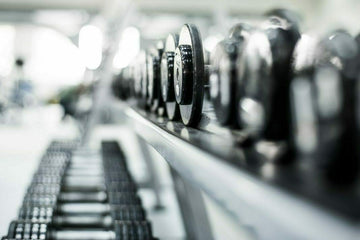Anyone who has never dealt with the topic of muscle building runs the risk of making beginner mistakes. To avoid these, the most typical mistakes are listed below.
More is better
Unfortunately, this assumption is as widespread as it is untrue. Even a simple increase in training volume has a detrimental effect on success. The so-called catabolic hormones such as cortisol have a muscle-degrading effect and increase with increased training duration. This means: the longer you train, the more muscle-degrading hormones are released.
If you train too often, your body doesn't have enough time to regenerate. However, muscles only grow during the supercompensation period, i.e. during the recovery phases. The rule of thumb here is: the harder the training, the longer the recovery phase.
More weight
The assumption that it has to be heavier is also wrong. Here the person training should ask themselves why it has to be heavier if it is not possible. Most beginners use large weight plates to lift them with a lot of momentum and to cheat heavily. This technique is more than counterproductive. Many people think at this point that it will eventually work if they just lift this excessive weight for long enough. It won't! Only when the technique is right can the increase be tackled.
The exercise selection
Although many people claim otherwise, exercises such as deadlifts, squats and general free weight training are considered to be particularly effective because these basic exercises do not place isolated strain on the body and therefore target more muscle groups. However, it is important that the technique of these basic exercises is first learned correctly, especially by beginners, as otherwise serious damage and injuries can occur. Squats performed correctly can counteract back pain, while if performed incorrectly they can trigger back pain.
First gain and then lose weight
Many people think that they have to eat a lot to gain muscle mass and then lose weight if necessary. Building muscle is not quite that easy. The longer the diet lasts, the more muscle mass is lost. This means that in the mass phase you can easily gain up to 10 kg, although only 3 kg of this can be considered muscle mass. If you go on a diet you would lose everything again. And maybe even more. That's why it's important not to let yourself go when it comes to eating. A moderate weight gain is better.
No cardio training
Many beginners skip warming up so as not to "waste energy unnecessarily". But that's wrong! During intensive strength training, muscles can easily injure themselves if they are not warmed up sufficiently. It is therefore important to warm up for at least three to five minutes to prepare the body for the harder training. And cardio training should not be skipped either. This improves regeneration, metabolism, oxygen uptake, fat loss, blood supply and energy supply. It is important that cardio is carried out alongside the main muscle training and that the two training units do not overlap. However, no more cardio should be done immediately after training, as the glycone stores are then empty and the muscle mass is at risk from renewed exertion. Cardio training should not be too strenuous. A 30 to 45 minute basic endurance training is recommended, with the pulse (of course depending on age) being around 130 beats per minute.
More repetitions for more endurance
Wrong! Basically, it sounds logical to train endurance through more repetitions and less weight. But that's not true, because strength training has absolutely nothing to do with endurance. Muscle training is anaerobic, although it should be noted that endurance can only be trained through aerobic exercises. These aerobic exercises should last much longer than two minutes, because the metabolism only draws in active oxygen after two minutes to cover energy requirements. Endurance can only be trained with cardio and results in better oxygen uptake, a larger heart volume and a higher number of mitochondria, as well as their higher performance.
The training breaks
From time to time, longer breaks from training are unavoidable. But there is no need to worry, because after a complete regeneration phase, it takes another two to three weeks before the body even thinks about losing muscle mass. And even if the break in training lasts for several weeks, it is not a big deal. The so-called memory effect ensures that rebuilding is quicker and easier.





